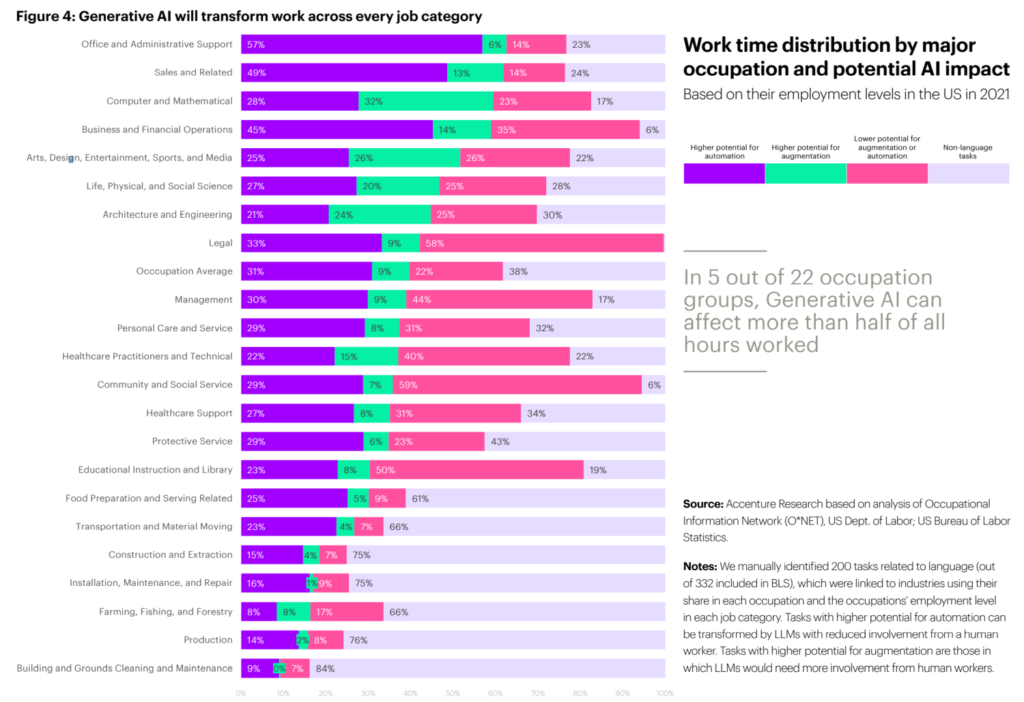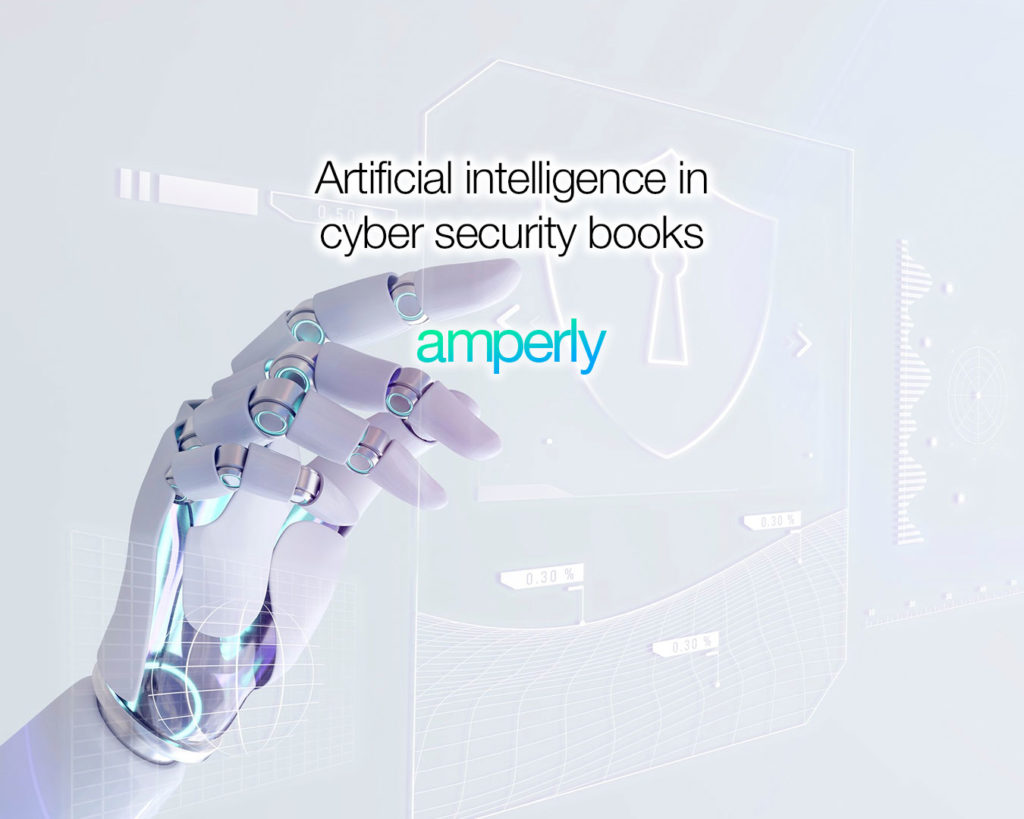As AI progresses the software you use will disappear. AI will eat software! All of it… There will be no Excel, Word, or Photoshop. You will be able to do everything by just talking to your phone.
Would you like to have an assistant who can do everything?
Well, in a couple of years you will have one. This will look much like in Star Trek people would casually talk to the ship’s computer.
Basically, you will explain to the computer what you want it to do, and it will do it. Of course, the “computer” will be just an interface to an AI. Neural net as an OS.
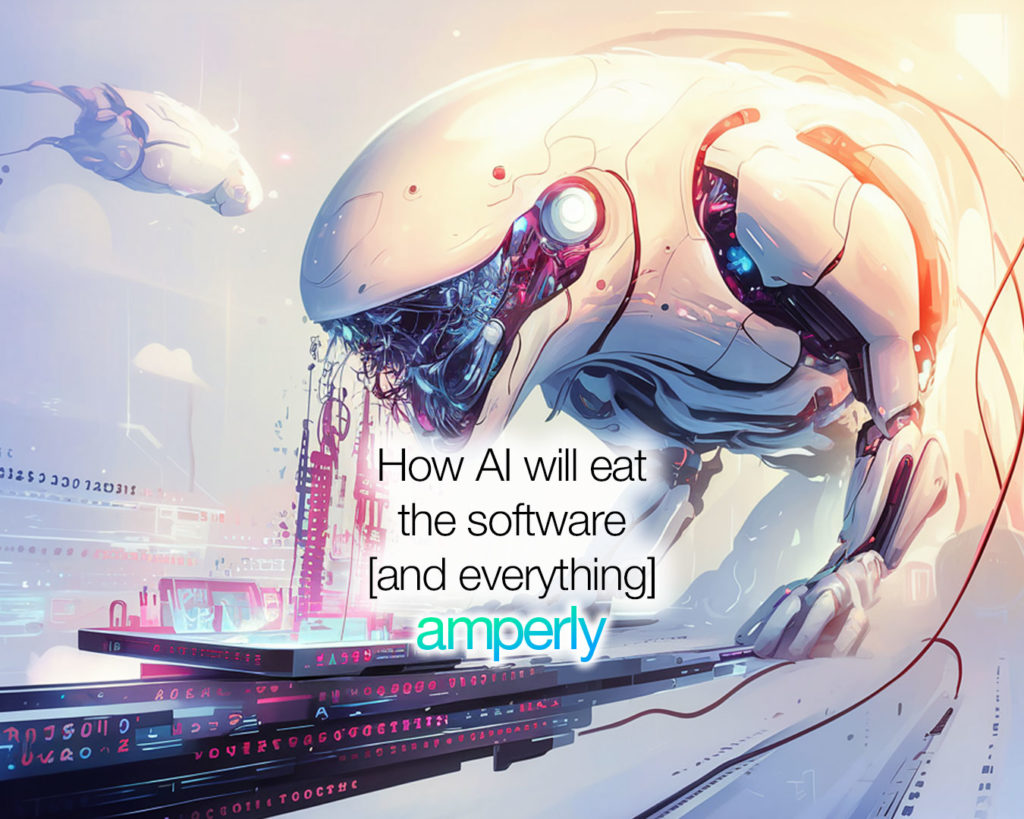
Let’s take an example from everyday business tasks. Sending an email newsletter to your customers. You tell the computer to send an email newsletter. The process starting after your request is similar to what a human does today when they need to send an email newsletter.
- First, AI asks you do you have any specific ideas what the email should cover.
- Then it will scan your recent transaction database to find out if there have been any products that sell exceptionally well. These may be promoted to capture the existing momentum.
- Next, it will check out your website for new content that has not yet been promoted or find old pieces of content that match the theme of the email it intends to send.
- Based on that, AI will create an outline of the email and list of products for you to review and accept.
As you are overwhelmed with all your other tasks you will simply click OK.
Here’s what Microsoft’s Satya Nadella has to say about it. You can find out what businesses are in the AI field and software field in this post.
There will be no computers or applications
Yes, there will be computers in mobile, desktop, or other form factor, but they will just become interfaces to the AI.
When ChatGPT came out on November 30, 2022, it didn’t have internet connection. So, people experimented to find out what would happen if AI played the role of a computer terminal. Would that terminal have an internet connection. At the time the trick didn’t work, but the idea is still valid. In the future AI can assume the role of any computer program.
For example, when I want to create a social media post that has a video explaining how to use a product. I would tell AI to create a video that would explain how a certain feature of the product works.
AI will eliminate a ton of human and computer tasks. Here’s an incomplete list of possible tasks AI can take over:
- Writing a script on how to showcase the feature.
- Collect user feedback to understand what needs to be explained.
- Create the video in a way that is most understandable to the users.
- Narrate the content of the video.
- Put graphics on the video to make it as clear as possible.
- Write the content of the social media post with the video based on the specifics of each social channel.
- Post the video on social media at the right time to get the most engagement.
- Answer the questions in comments in a personal way.
- Creating additional content to address new needs discovered by the users.
All this can be personalized in such a way that the key points in the video, the tone of the narration, gender of the narrator, and the level of the explanation will match the viewer.
The people and tools that get replaced in the scenario above:
- Word processor > copywriter.
- Keyboard, mouse, camera > people making the tools.
- Studio with all the equipment in it > Camera operator and other studio help.
- Audio editing software > person editing your audio to make it perfect.
- Adobe Premiere Pro > the person who edits your videos.
- Adobe After Effects > probably the same guy who edits your videos.
- Analytics tools > media planner or other person analyzing your results.
- Social media scheduling app > person responsible for your social media marketing.
This list is just an example. The amount of people and software that an advanced but not general AI can replace is almost unlimited. All this will happen by the end of this decade.
People will love it!
AI will give you results faster, it will save the time you personally have to put in and give you the results that would be almost impossible to achieve without the help of the AI, like the 1 to 1 personalization of all the content.
Every tool will be customized to you
I use Strava for running. I used to use Endomondo but Uderarmor destroyed the best running app in the world. Strava is great, but it lacks the most important thing I want in a running app, giving me my heart rate in the headphones. Now, I an option to use the app that has the functionality but none of my friends use. Or… I can use Strava, that most of my friends use, but doesn’t have the functionality.
In the future, AI will monitor the GPS, accelerometer, and HR sensors in my phone and give me exactly what I need. The data is all there, but Strava has decided on the user interface that is not 100% for me.
The future of programming is AI
There will be 2 programming languages.
Human, that’s what you use to tell the AI what you want in your native language.
Machine code, this is the final output when specific programm needs to run on your specific hardware.
It is hilarious to watch the current early demos of AI writing software. I have made some small useful apps and automated workflows. In 5 or 10 years this will be completely different. You will just tell your phone what you want to happen and AI will do just that.
It will create an app on the fly that will do exactly what you want. It could be just for one-time use. In other cases, the app will stay on our device and evolve base on your usage patterns and feedback.
Humans use programming languages that make it possible for us to give instructions to computers. AI will work directly with machine code because it doesn’t need several layers to actually understand the code. Machine code is also 100 times faster than Python or other high-level languages we use so our puny brains could actually understand what is going on. This also means that programs can do much much more because the are several orders of magnitude better optimized.
There will be no software companies other than the ones that make the AI work.
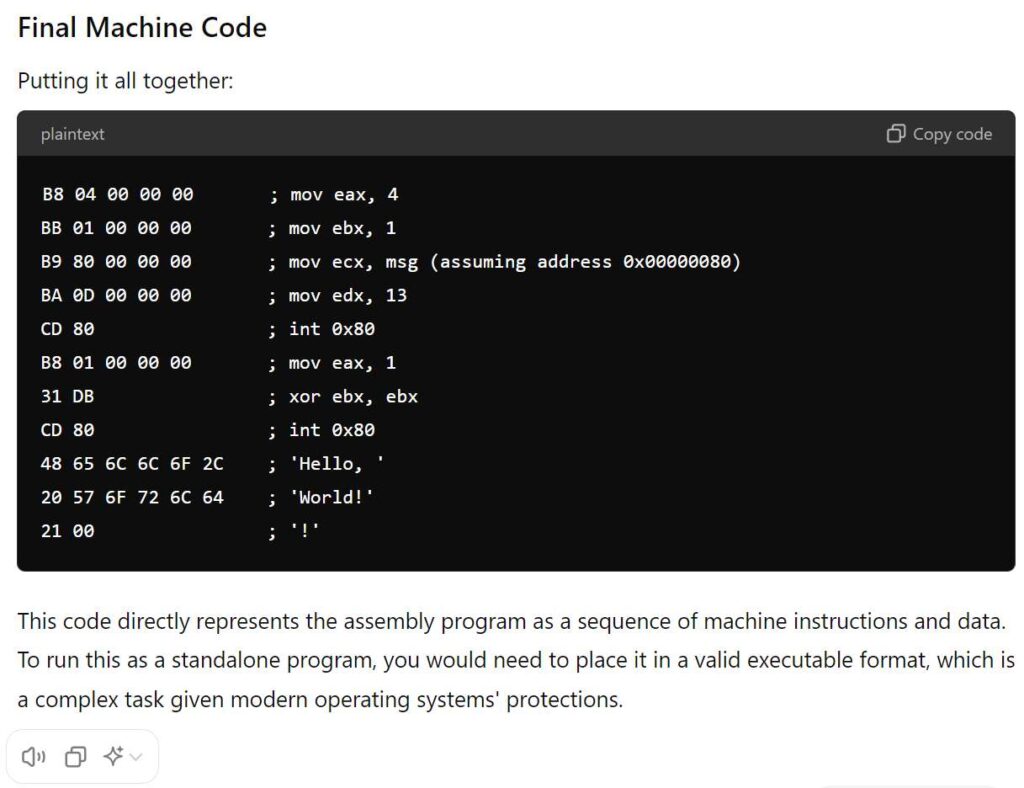
AI will include an internal computer: AI will eat software
ChatGPT, other LLMs, or a completely new tech will include an internal computer and AI will eat all software. In 2011, Marc Andreessen wrote Why Software Is Eating the World. Now, there will be just one kind of software doing all the eating, AI.
When I ask you to write an article or create a movie, you can do that in your head. You will need tools to make this real, but most of us can imagine the result.
Soon, AI can do that too, but it will have the ability to output the whole thing on your screen.
Every digital tool you can imagine will be replaced by AI. There will be no programs. No Word, no Excel, not Premiere Pro, or Canva. AI will take over everything made in software.
The upside is that AI can create any program you ask for. Most of us have had the experience where the app we use doesn’t have some obvious function or works in a way that doesn’t exactly meet our needs. This will be a thing of the past. Anything you can ask, AI will deliver and then some, as it can anticipate your desires and also deliver the parts you left unsaid.
The point is that you don’t need a program or an app, you need a result. Let’s say you want to build a desk for your home office as DIY project. What programs would you use to make the drawings? You don’t have to know, you just ask AI and it will deliver the drawings in the format you want.
What will happen to the software companies?
There will be no other software companies than the ones that create AI tools. Right now, we can see how big tech companies are racing to create the best AI tools. OpenAI, Microsoft, Google, Amazon, Meta, and others pour hundreds of millions into the AI. You can read more about what are the key companies in the AI race here.
All consumer and business software tasks will be solved in the mind of an AI. There may be some development in the hardware and data center areas where programming is needed for interfacing AI with the hardware.
What will happen to developers?
There could be some developers left for the server and hardware side. Some developers are needed to tackle very specific problems. For a short period, the best humas may be better in some areas than AI. Programming will not mean writing code but what to write. Knowing how to write code won’t be a marketable skill anymore. Understanding how systems work will still be valuable for some time.
But other than that, all software tasks are solved by the AI using its own internal capabilities.
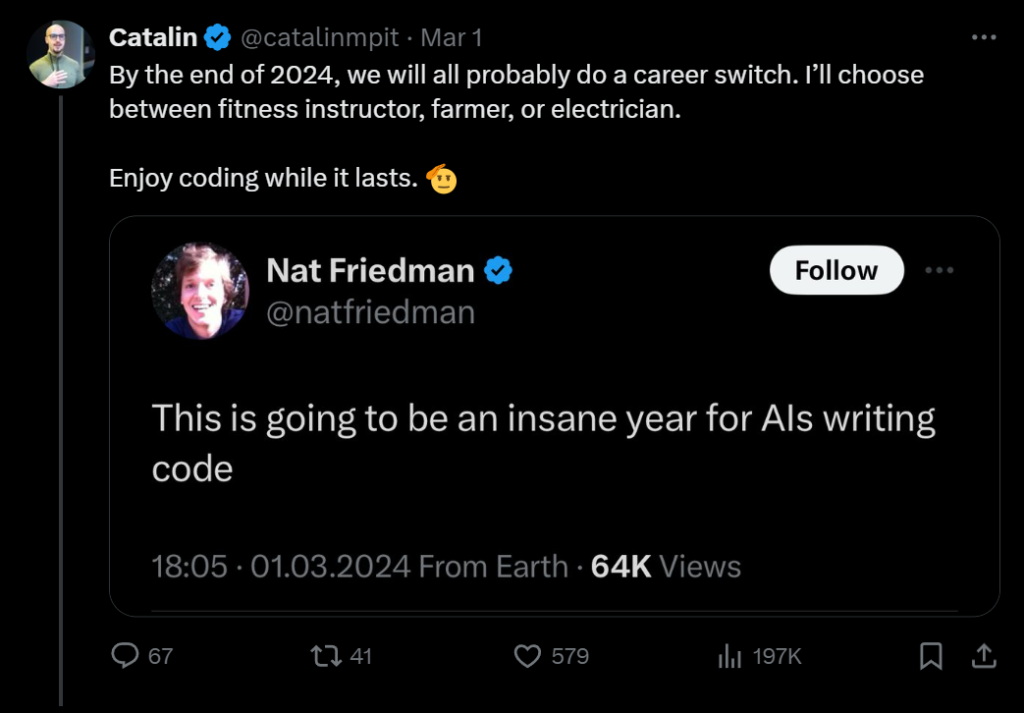
Then time-line is probably not as fast as the end of 2024 but it will be sooner than later. Source
Impact on employment beyond software
AI will have a broad impact on the workforce, including sectors not directly related to technology but which will be affected by automation and AI. This includes industries like retail, customer service, and knowledge workers whose jobs have been deemed safe from automation in the past.
Here are the key points about the impact of AI on employment beyond software development:
Widespread Job Displacement: AI and automation are not just affecting technology-related jobs but are also transforming traditional sectors such as education, legal, finance, and creative industries. In the widespread impact no job sector is entirely immune to the changes brought by advancements in AI.
Retail sector: In retail, AI can manage inventory, personalize customer experiences, and even operate checkouts, reducing the need for human staff in various roles.
Changes in customer service are already happening: AI-driven chatbots and virtual assistants are increasingly handling customer inquiries and support tasks, which can lead to a reduction in the need for human customer service representatives.
Creative industries at risk: Even creative fields, traditionally seen as requiring a human touch, are being impacted by AI’s capabilities in generating written content, art, music, and even video content, potentially displacing jobs in these areas.
Societal and economic implications: The broad impact of AI on employment has significant societal and economic implications, including increase in unemployment rate and the need for social safety nets and policies to support those affected by job displacement.
Policymakers, businesses, and workers need to understand the coming changes if they want to survive the initial shock presented by the integration of AI into various sectors of the economy.
Now what?
We will start to see these changes in the next couple of years. By 2030 the world will be a lot different. When you are preparing for the coming changes, there are two main skills that should still give you an edge in your given field, and one that you should have as a backup plan:
- Solving complex problems
- Leading people
- Very specialized physical skills
These skills will help you when almost all other knowledge work is replaceable with AI. Even solving complex problems may fall to the AI.
However, from now to the time things start to happen dive into AI and make sure you use its full potential and you will not be the one left behind.
